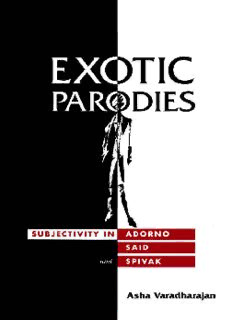
Exotic Parodies: Subjectivity in Adorno, Said, and Spivak PDF
Preview Exotic Parodies: Subjectivity in Adorno, Said, and Spivak
Exotic Parodies This page intentionally left blank Exotic Parodies Subjectivity in Adorno, Said, and Spivak Asha Varadharajan University of Minnesota Press Minneapolis London Copyright 1995 © by the Regents of the University of Minnesota All rights reserved. No part of this publication may be reproduced, stored in a re- trieval system, or transmitted, in any form or by any means, electronic, mechanical, photocopying, recording, or otherwise, without the prior written permission of the publisher. Published by the University of Minnesota Press 111 Third Avenue South, Suite 290, Minneapolis, MN 55401-2520 Printed in the United States of America on acid-free paper Library of Congress Cataloging-in-Publication Data Varadharajan, Asha. Exotic parodies: subjectivity in Adorno, Said, and Spivak / Asha Varadharajan. p. cm. Includes bibliographical references and index. ISBN 0-8166-2528-X ISBN 0-8166-2529-8 (pbk.) 1. Subjectivity in literature. 2. Adorno, Theodor W., 1903-1969 —Criticism and interpretation. 3. Spivak, Gayatri Chakravorty—Criticism and interpretation. 4. Said, Edward W.—Criticism and interpretation. 5. Literature, Modern—20th century—History and criticism. 6. Imperialism in literature. I. Title. PN56.S46V37 1995 94-23640 809'.93353—dc20 The University of Minnesota is an equal-opportunity educator and employer. [Aziz] remembered that he had, or ought to have, a motherland. Then he shouted: "India shall be a nation! No foreigners of any sort! Hindu and Moslem and Sikh and all shall be one! Hurrah! Hurrah for India! Hurrah! Hurrah!" India a nation! What an apotheosis! Last comer to the drab nineteenth-cen- tury sisterhood! Waddling in at this hour of the world to take her seat! She, whose only peer was the Holy Roman Empire, she shall rank with Guatemala and Belgium perhaps. Fielding mocked again. And Aziz in an awful rage danced this way and that, not knowing what to do, and cried: "Down with the English anyhow. That's certain. Clear out, you fellows, double quick, I say. We may hate one another, but we hate you most. If I don't make you go, Ahmed will, Karim will, if it's fifty or five hundred years we shall get rid of you, yes, we shall drive every blasted Englishman into the sea, and then"—he rode again furiously—"and then, " he concluded, half kissing him, "you and I shall be friends." "Why can't we befriends now?" said the other, holding him affectionately. "It's what I want. It's what you want." But the horses didn't want it—they swerved apart; the earth didn't want it, sending up rocks through which riders must pass single-file; the temples, the tank, the jail, the palace, the birds, the carrion, the Guest House, that came into view as they issued from the gap and saw Mau beneath: they didn't want it, they said in their hundred voices, "No, not yet," and the sky said, "No, not there." — E. M. Forster, A Passage to India This page intentionally left blank Contents Acknowledgments ix Introduction xi 1. The End(s) of (Wo)Man; or, The Limits of Difference 1 2. Rethinking the Object 20 3. Theodor W. Adorno 34 4. Gayatri Chakravorty Spivak: The "Curious Guardian at the Margin" 75 5. Edward W.Said 113 6. Conclusion: "... the inextinguishable color from non-being" 137 Notes 143 Bibliography 149 Index 167 vii This page intentionally left blank Acknowledgments This project owes much to the critical acumen and generosity of friends, col- leagues, mentors, and institutions. I can't, of course, cite them all, for which sin of omission I hope I will be forgiven. Let me begin with the progenitors, as it were, of this book. To Janaki Bakhle (Mrs. Fury is my preferred appellation!), my deepest gratitude for impromptu lessons on the incommensurability of the object (augmented by the number of times her last name is consigned to various food groups, including bagels and broccoli), for ruthless and entirely appro- priate excisions of examples of verbosity and density in my prose, for unre- mitting faith in the value of my work, and for what I hope will continue to be a deep and abiding friendship. To Robert Mosimann, Laura Westlund, the staff of the University of Minnesota Press, and my student Emily Todd, my appreciation of their en- ergy and efficiency. To the anonymous readers of my manuscript, my gratitude for their generous and thought-provoking comments. To the University of Minnesota's English department, my thanks for a nonteaching quarter at the beginning of my tenure. It helped me to make quick progress on my book. This book continues to bear traces of its inception as a doctoral disserta- tion at the University of Saskatchewan in Canada. Len Findlay's theoretical rigor and political commitment inspired me to write this work, while my professors and colleagues at Saskatchewan, Newfoundland, and Kingston re- mained sources of constant encouragement through this book's numerous transmutations. This book is dedicated to my family (for enabling and understanding my reluctant exile) and to Rhonda and April Anderson (for making me feel at home in it). ix
